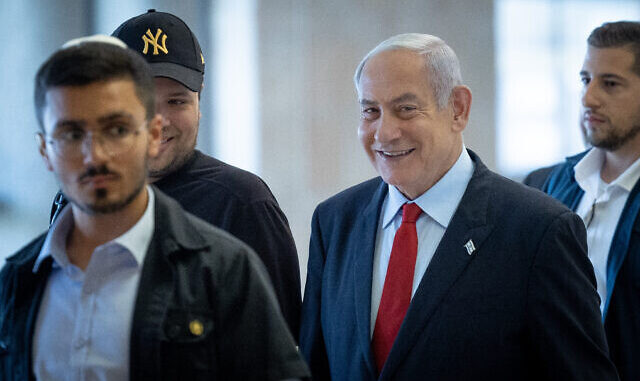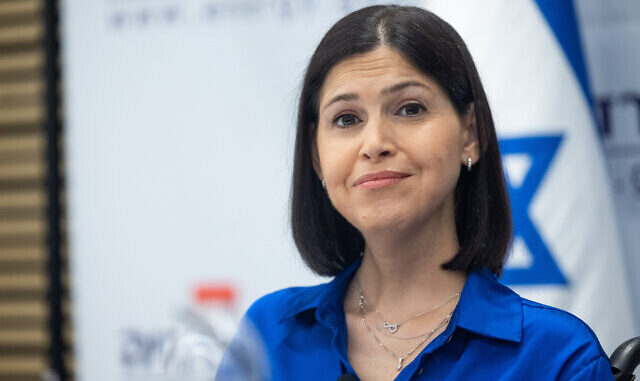National Unity head indicates party could bolt judicial compromise talks if coalition takes both the seats allocated to MKs on Judicial Selection Committee
29 May 2023, 8:13 pm

Prime Minister Benjamin Netanyahu arrives at Likud’s Knesset faction meeting, May 29, 2023. (Yonatan Sindel/Flash90)
Prime Minister Benjamin Netanyahu told his Likud party on Monday that his government’s temporarily suspended plans for a radical shakeup of the judiciary are “not dead,” according to statements leaked from Likud’s internal Knesset faction meeting and broadcast on Monday evening.
“Don’t believe what you read, including in Yedioth Ahronoth, especially in Yedioth Ahronoth,” Netanyahu was heard saying, in reference to a report in that Hebrew newspaper that he had said the planned judicial overhaul legislation was dead. “There are lots of things, lots of moves. I don’t want to get into the details,” he said.
“Those who know what’s going on, know, and others will [know] in the future,” Netanyahu added. “I know the issue is causing a certain frustration, and a situation whereby we’re not sharing everything at certain moments, but it’s for a good cause.”
Notably, according to Channel 12, which broadcast the excerpts, Netanyahu did not cite his previously stated desire to achieve a compromise with the opposition over judicial reform. This, the report speculated, was apparently out of a desire to pacify his coalition partners, who are pressing him to advance the current, highly controversial legislation which would largely subjugate the judiciary to the control of the governing coalition.
According to a Likud representative, however, Netanyahu did tell his fellow party members at the faction meeting that Likud must make every effort in the ongoing discussions with the opposition in order to reach broadly accepted agreements.
Meanwhile, opposition leaders Yair Lapid and Benny Gantz, whose parties have been hashing out potential terms of a compromise reform deal with coalition representatives at the President’s Residence, refused to confirm Monday that a deal package was on the table, while Gantz stressed that his National Unity party would only agree to a deal that closes the door on changing Israel’s system of governance.
“I am telling the public clearly and directly: There will be no agreements without a clear and guaranteed commitment that there will be no continuation of legislation touching upon Israel’s governance,” Gantz said at the outset of National Unity’s Knesset faction meeting, and “unless we reach broad agreement and there is a mechanism to ensure that [the promises] are indeed implemented.”
Furthermore, Gantz warned that if Netanyahu’s coalition prevents the opposition from sending a representative to sit on the Judicial Selection Committee, as is traditional, it could end his party’s participation in talks.
Knesset Speaker Amir Ohana on Monday set the vote on the two Knesset representatives to the panel for June 14.
Negotiation teams have been meeting under the auspices of President Isaac Herzog since early April to try to find a way forward, after the coalition’s plan to overhaul the judiciary upended society, diplomacy and the economy.
Yisrael Beytenu party head Avigdor Liberman on Monday again slammed his opposition colleagues’ continued participation in talks, saying this provided cover to what he described as a deceitful coalition, with reform diehards pressuring the coalition to unilaterally legislate hard curbs on the country’s judiciary.
The premier’s comments came only hours after Hebrew media outlets reported a potential coalition offer to freeze legislation for a year, provided agreements can be reached to limit the authorities of governmental legal advisers and curtail judges’ broadly defined powers to rule on the so-called “reasonableness” of government decisions.
Gantz said his party would not support any measure that infringes upon judicial independence, and extended that to the independence of legal advisers.
Emphasizing that he would not agree to a partial deal, Gantz said he refuses to hand a “blank check” to the coalition that would “allow Netanyahu to bolster his position and make decisions at a time and place convenient for him.”
He said National Unity will continue attending talks at the President’s Residence, the next of which is scheduled for Tuesday, provided that “progress is made” and the opposition receives one of the two seats for lawmakers on the Judicial Selection Committee.
“If this does not happen and the coalition elects two candidates or does not bring the representatives to a vote, it will mean it is changing the rules of the game,” Gantz said, hinting that his party could bolt talks.
Opposition Leader Yair Lapid similarly declined to confirm reports about closed-door negotiations at the President’s Residence, saying that his first priority was now to place an opposition lawmaker on the panel that picks Israel’s judges.
At the Yesh Atid faction meeting, Lapid said he expects that the panel, once finalized, should be convened in a “reasonable” amount of time, which he loosely defined as seven to ten days.
In addition to trading threats with Netanyahu, Lapid and Gantz on Monday squabbled over the opposition’s potential nominee for the Judicial Selection Committee seat.
Lapid reaffirmed his backing for Yesh Atid MK Karine Elharrar, while National Unity accused Lapid of “putting the cart before the horse.” The tiny, four-seat Labor party put forward MK Efrat Rayten as its own candidate, although it said it would accept an agreed-upon candidate and urged coalition heads to meet and decide.

Karine Elharrar holds a press conference in Jerusalem, May 30, 2022 (Yonatan Sindel/Flash90)
Opposition parties agreed, however, on their stance against the government’s upcoming resolution to enshrine Zionism as a strategic value for the nation, which would allow the state to give preference to Jews in the allocation of resources.
The government had been slated to approve the Otzma Yehudit-sponsored measure on Sunday, but it was delayed after ultra-Orthodox ministers said they were concerned that the resolution would allow the government to give preference to IDF veterans, and asked to include parallel rights for those engaging in religious studies, which their community overwhelming chooses over military service.
“This government, which is going to destroy the model of the people’s army, prevents core subject studies [in the Haredi community] and incentivizes [Jewish] streams that distance themselves from Zionism, wants to bring about a decision on imbibing Zionist values? It should study practical Zionism instead of institutionalizing racism,” said Gantz.
Lapid also slammed the initiative, saying that “according to this law, a Jew that shirks army services gets more” than a Druze military veteran.
Otzma Yehudit party chief Itamar Ben Gvir attacked Lapid as “ignorant and a liar” for slamming the far-right party’s proposal, saying that “the proposal not only does not prioritize Jews, but is valid on behalf of soldiers and IDF veterans from any demographic.”
National Security Minister Ben Gvir called Lapid “an extreme leftist who opposes Zionism.”
A source in the Prime Minister’s Office confirmed to The Times of Israel that the government had yet to agree upon the text for the resolution, and the vote is yet to be scheduled.



It looks like it must be the “Left way” or the highway!
And the West will blackmail Israel.